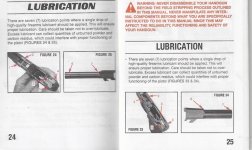Leon,
I'll be more than happy to clean those things up for you. Just bring them on by and I'll get 'er done. Bring a pizza and some soda too and we can sit on the back patio and shoot the breeze while I'm cleaning them for you.
Myth.
Yes, firearms need some lubrication, but the idea that there cannot be too much is ludicrous. It's not the over lubrication itself that's the issue, it's what it does that's the problem.
First of all, every molecule of oil or grease that squeezes out is wasted. It's only the tiny bit that remains on the contact surfaces that is actually doing any good. So, more oil is just more oil and none of that is helping lubricate the gun.
Secondly, that oil will attract dirt. Dirt is the enemy of a functioning gun. This is why using the right amount is important.
In the video by Larry Vickers he doesn't do a serious test. He just dunks the gun in oil and starts shooting. This is just a more viscous version of dunking the gun in water. Of course the gun will work that way. A proper test would be to dunk the gun in oil and then drop it in the dirt. The over lubricated gun, that is now caked in dirt, will malfunction before the properly lubricated one every time.
It's a shame you treat people this way. You're placing your own feelings over what the manufacturer says is necessary. What you should care about is if their gun functions. If their gun malfunctions, then counsel them about proper maintenance.
Yes, the gun shouldn't be absolutely dry, but it shouldn't be dripping with lubricant either.



